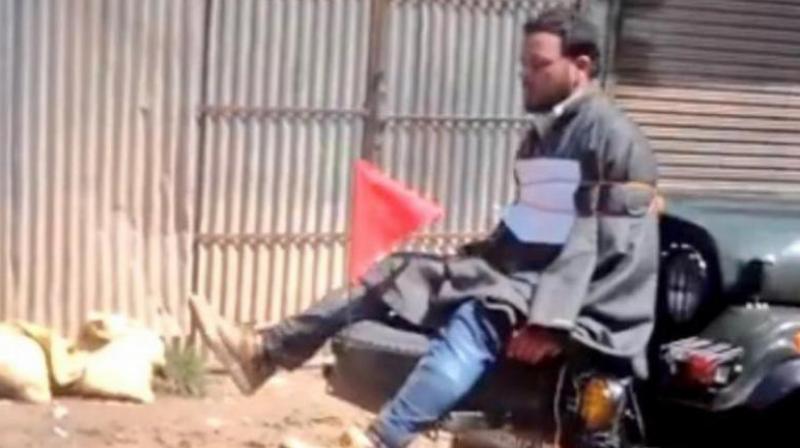Human rights body asks J&K to pay Rs 10 lakh to human shield victim Farooq Dar
Dar was used as a human shield by Major Gogoi, against the stone pelters who had allegedly surrounded a group of armed personnel.

Srinagar: The Jammu and Kashmir State Human Rights Commission (J&KSHRC) has directed the State government to pay a compensation of Rs 1 million to Farooq Ahmed Dar, a Kashmiri shawl weaver who was used as a "human shield” by the Army during the Srinagar Lok Sabha by- poll in April this year.
Dar, a resident of Chhil Brass village of central Budgam district, was tied to the bonnet of an Army jeep during the April 9 by-poll, evoking rage within the State and beyond with human rights groups including Amnesty International demanding action against those responsible.
A video which went viral soon after the incident showed Dar tied to the bonnet of an Army jeep with a placard and, in the background, a warning “Those who throw stones will meet the same fate” could be heard.
Dar had later said that he was caught by the troops in Gundipora village of the district, who tied him to the front of their jeep before proceeding towards Beerwah town. An FIR was registered by the Jammu and Kashmir police against the Army.
On 15 April, the Army constituted a court of inquiry in the incident, and it is not yet known if the probe has been completed. A report appearing in a section of media had a few weeks later said the court of inquiry has given a clean chit to the Army officer involved in the act but the Army was prompt in clarifying that the probe is still on.
Dar had filed a formal complaint against Army Major Leetul Gogoi, the officer involved in the act, in May through a local human rights activist Ahsun Antoo, chairman, International Forum for Justice and Protection of Human Rights.
The move came amid a major controversy that surfaced when Major Gogoi of 53 Rashtriya Rifles was awarded ‘Commendation Card’ for his “sustained distinguished service” in counterinsurgency operations in Jammu and Kashmir by Army Chief General Bipin Rawat even when the Army had yet to complete the inquiry into the incident and the police has said that the case registered against him in the local police station has not been quashed either.
Major Gogoi had defended the act saying that if he had not done what he did that day “at least 12 or more lives” would have been lost, and that “had I fired there would have been many casualties.”
The J&KSHRC on Monday said that Dar should be compensated for undergoing “humiliation, physical and psychiatric torture, stress, wrongful restraint and confinement” due to the act. Justice (retired) Bilal Nazki, the chairperson of the Commission, in the judgment said, “I’ve no doubt in my mind that Farooq Ahmad was subjected to torture and humiliation, besides (being) wrongly confined.”
He also said that the Army action led to trauma, resulting in psychiatric stress which may remain with him for the rest of Dar’s life. The judgment further reads, “For the humiliation, physical and psychiatric torture, stress, wrongful restraint and confinement, the commission thinks it appropriate to direct the State government to pay a compensation of Rs 10 lakh to the victim.”
The Commission, constituted in January 1997 as autonomous state body with quasi-judicial powers is tasked to investigate any violation of human rights in the restive State. It directed the State government to comply with the direction within six weeks.
However, the judgment is recommendatory in nature and would need the approval of the state government for implementation. The Commission asked the Chief Secretary of the State to a compliance report before it within the same period.”
The Commission has referred to the police report which had confirmed Dar was tied to the Army vehicle bonnet and used as a human shield. But it observed that it was “handicapped” by the fact that it could not refer to the conduct of the Army because of the limited applicability of the Protection of Human Rights Act, 1993.
“There cannot be any debate as to whether the treatment given to Dar was a violation of human rights or not. There are laws in this country, and international laws, which prohibit such a treatment even to a convict. Such treatment to a human being cannot be accepted by a civilised society,” Justice Nazki observed.
He also said that the J&KSHRC chose not to issue any notice to the Central government or the Army “but the fact remains that the protection of life and liberty of the people is basic responsibility of the State government”.

